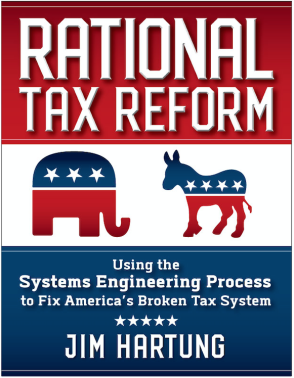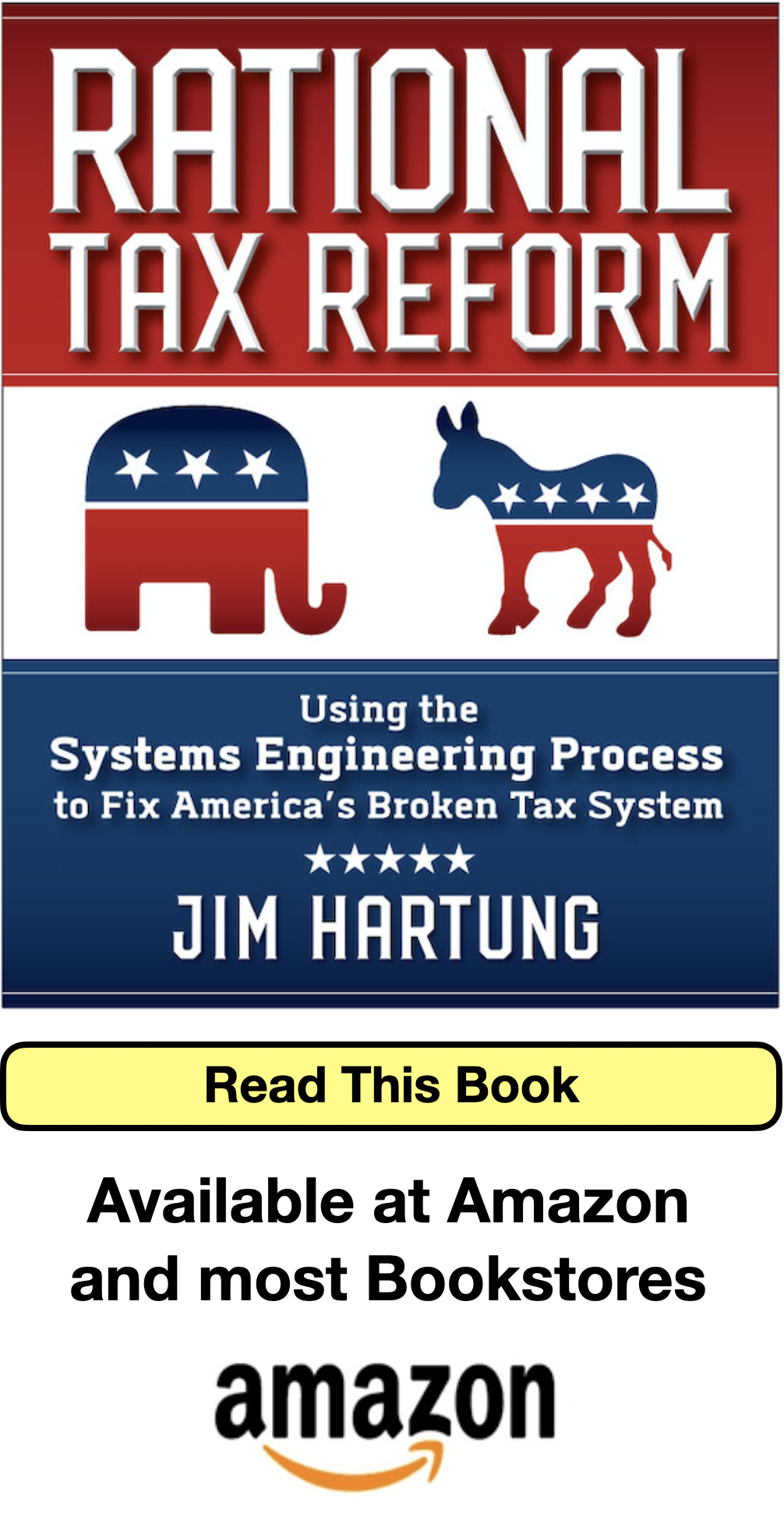Rational Tax Reform

America’s tax system is a mess—and our political system is broken. This book describes how to fix both using systems engineering, the process engineers use to develop complex products such as aircraft and spacecraft.
Rational Tax Reform uses the systems engineering process to develop a comprehensive nonpartisan tax reform proposal. The key features of the proposed tax reform are as follows:
1. Balanced budget: The proposed tax reform balances the federal budget and funds universal healthcare without increasing the economic burden on taxpayers or decreasing other government services. It does this by (1) reforming the healthcare system and tax code to make them better and more efficient and (2) using the resulting cost savings to balance the budget.
2. Healthcare Reform: The proposed tax reform includes a new approach to universal healthcare, which I call Medicare Choice. With this system, those who want Medicare will receive it. Those who don’t want Medicare can opt out and receive premium support, which can be used to purchase any healthcare insurance they choose. Medicare Choice will improve healthcare, reduce costs, and maximize personal choice and competition.
3. Social Security: The proposed tax reform restores Social Security to financial health without reducing benefits by 1) eliminating the wage cap subject to the payroll tax and 2) using all payroll tax revenue to fund Social Security (no diversion for Medicare).
4. Individual income tax: The proposed tax system simplifies the tax code. All income is taxed at the same (progressive) rates. Itemized deductions are eliminated and replaced with a larger standard deduction. Every taxpayer and dependent also receives a $1,000 refundable tax credit. Other tax credits are eliminated. Individual income tax rates are slightly lower than in the current tax code.
5. Business tax: The corporate income tax (currently 21%) is eliminated and replaced with a broad-based value-added tax (VAT) with a lower tax rate (13%). The VAT is an efficient tax that inherently taxes corporate profits as well as other business costs and expenses. It provides sufficient revenue to fund Medicare Choice. Eliminating the corporate income tax will stimulate business investment and create jobs.
6. Payroll tax rate: The payroll tax is reduced from 15.3% to 14%. Nevertheless, it provides sufficient revenue to fund Social Security fully since the cap on taxable income is eliminated, and no payroll tax revenue is diverted to fund Medicare.
7. Bipartisan: The proposed tax reform achieves the most important objectives of Republicans and Democrats.
8. Carbon dividends: Revenue-neutral carbon dividends are included to address climate change. With carbon dividends, oil, natural gas, and coal companies will pay a steadily increasing fee on their products, and all fees collected will be returned to the American people through quarterly dividend checks. This should reduce net US greenhouse gas emissions to near zero by 2050 while providing every taxpayer and dependent with carbon dividends ranging from about $500 to $1,500 annually.
9. Balanced budget feedback mechanism: The proposed tax reform includes an automatic feedback mechanism to encourage Congress and the president to control spending and balance the federal budget.
10. Tax transparency: All candidates for high-level public office must disclose their tax returns. This is done to promote good governance and reduce corruption.
11. Investment in future growth: The proposed tax reform increases investment in the seeds of future growth, especially education and infrastructure. It does this by increasing funding for the Highway and Mass Transit Trust Funds and creating (and funding) an Education Trust Fund.
12. Inequality: The proposed tax reform includes many features to reduce inequality. Three of the most important are: First, it is a progressive tax system that taxes all sources of income at the same (progressive) rates and provides a sizeable refundable tax credit and carbon dividends for all taxpayers and dependents. Second, it includes a strong social safety net anchored with universal healthcare (Medicare Choice) and a financially sustainable Social Security system. Third, it creates jobs, especially for low-income and middle-income taxpayers because it eliminates the need for businesses to fund their employees’ healthcare, increases investment in education and infrastructure, and replaces the corporate income tax with a more efficient value-added tax.
The proposed tax reform is only one example of many possible alternatives—yet it clearly illustrates how systems engineering could enable rational, enlightened, and nonpartisan tax reform.
Why Read This Book?
The last major bipartisan tax reform was enacted in 1986, over 30 years ago. Since then, many politicians, policymakers, and think tanks have developed bipartisan tax reform proposals. None have been enacted. So, what makes the ideas in this book any different?
Rational Tax Reform proposes a totally new approach (systems engineering) to develop a novel nonpartisan tax reform proposal. This approach has two significant advantages. First, the systems engineering process enables the development of a better tax reform proposal. Second, systems engineering provides Congress with a systematic process to improve upon this proposal and enact nonpartisan tax reform.
Reviewer Comments
“This book is clear and lucid. It succeeds beautifully in demonstrating how rationalizing one part of the system (the tax system) can be the key to addressing many other vexing problems such as health care, social inequality, and climate change. I see lots of opportunities to deploy the same SE approach to other social systems.” — Dr. Saif Benjaafar, Distinguished McKnight Professor and Head, Department of Industrial and Systems Engineering at the University of Minnesota College of Engineering and Science
“I am seriously impressed with this book and the proposed tax reform. I like the practical, nonpartisan SE approach to tax writing. I strongly agree with the tax reform proposal except for a few small differences. Now let’s get these ideas to tax writers, federal and state.” — T. R. Reid, New York Times bestselling author of A Fine Mess: A Global Quest for a Simpler, Fairer, and More Efficient Tax System and The Healing of America: A Global Quest for Better, Cheaper, and Fairer Health Care
“The SE process is so powerful and logical, I wonder why politicians are not already using it to develop government policy.” — Stephanie Hoogstad
“The proposed tax reform is ingenious. Send a copy to the president and every member of Congress.” — Suzie Housley
“This book infuses practicality, logic, and dynamism into the normally dry subject of tax reform. It makes tax reform interesting.” — Kit Duncan
"Rational Tax Reform offers a clear and realistic method to tackle even the largest of problems. The tax code is not a monster with fangs. It can easily be a family pet once we teach it some manners.” — Marni MacRae
“The proposed tax reform and SE process will appeal to a wide range of taxpayers across the political spectrum because it is fact-based and data-driven rather than ideological.” — Akinola Osebi James
“This book makes the often cloudy subject of tax reform completely transparent. The plan makes sense. SE is everything our country needs right now. All Americans should read this book.” — Whitney Baer






